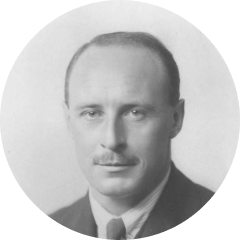Geoffrey Faber
(1889–1961)
Geoffrey Faber (1889–1961), publisher and poet, was educated at Malvern College and Christ Church, Oxford, where he took a double first in Classical Moderations (1910) and Literae Humaniores (1912). He was called to the Bar by the Inner Temple (1921), though he was never to practise law. In 1919 he was elected a prize fellow of All Souls College, Oxford, which he went on to serve in the capacity of Estates Bursar, 1923–51. Before WW1 – in which he served with the London Regiment (Post Office Rifles), seeing action in France and Belgium – he spent eighteen months as assistant to Humphrey Milford, publisher of Oxford University Press. After the war he passed three years working for Strong & Co. Ltd, brewers (there was a family connection), before going in for publishing on a full-time basis by joining forces with his All Souls colleague Maurice Gwyer and his wife, Lady Alsina Gwyer, who were trying to run a specialised imprint called the Scientific Press that Lady Gwyer had inherited from her father, Sir Henry Burdett: its weekly journal, the Nursing Mirror, was their most successful production. Following protractedly difficult negotiations, in 1925 Faber became chair of their restructured general publishing house, which was provisionally styled Faber & Gwyer.
After being introduced by Charles Whibley to T. S. Eliot, Faber was so impressed by the personality and aptitude of the 37-year-old American that he chose both to take on the running of the Criterion and to appoint Eliot to the board of his company (Eliot’s Poems 1909–1925 was one of the first books to be put out by the new imprint, and the firm’s first best-seller), which was relocated from Southampton Row to 24 Russell Square. By 1929 both the Gwyers and the Nursing Mirror were disposed of to advantage, and the firm took final shape as F&F, with Richard de la Mare and two additional Americans, Frank Morley and Morley Kennerley, joining the board. Faber chaired the Publishers’ Association, 1939–41 – campaigning successfully for the repeal of a wartime tax on books – and helping to set up the National Book League. He was knighted in 1954, and gave up the chairmanship of F&F in 1960. His publications as poet include The Buried Stream (1941), and his works of non-fiction were Oxford Apostles (1933) Jowett (1957), and an edition of the works of John Gay (1926). In 1920 he married Enid Richards, with whom he had two sons and a daughter. See further Toby Faber, Faber & Faber: The Untold Story of a Great Publishing House (2019).
